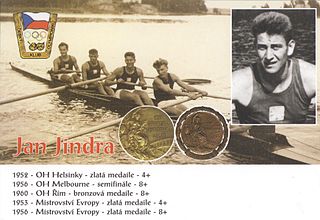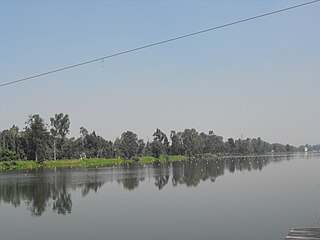
The men's 800 metres event at the 1948 Olympic Games took place July 30, July 31 and August 2. Forty-one athletes from 24 nations competed. The maximum number of athletes per nation had been set at 3 since the 1930 Olympic Congress. The final was won by the American Mal Whitfield. It was the first of Whitfield's two wins in the event, the second of four consecutive American victories, and the fifth overall United States win in the 800 metres. Arthur Wint earned Jamaica's first Olympic medal in their debut games with silver; he would take gold in the 400 metres a few days later. Marcel Hansenne took France's first 800 metres medal with bronze.
The men's 4 × 400 metres relay event at the 1948 Olympic Games took place on 6 and 7 August. The United States team won the final with a time of 3:10.4.

Iran competed at the 2012 Summer Olympics in London, from 27 July to 12 August 2012. The nation has competed at every Summer Olympic games since its return in 1948, after having made their debut in 1900, with the exception of the 1980 and 1984 Summer Olympics. The National Olympic Committee of the Islamic Republic of Iran sent the nation's second-largest delegation to the Games, one less than it sent to Beijing. A total of 53 athletes, 45 men and 8 women, competed in 14 sports. This was also the youngest delegation in Iran's Olympic history, with half the team under the age of 25, and many of them are expected to reach their peak in time for the 2016 Summer Olympics in Rio de Janeiro. Heavyweight boxer Ali Mazaheri was the nation's flag bearer at the opening ceremony.

The men's single sculls competition at the 1952 Summer Olympics took place at Meilahti, Helsinki, Finland. The event was held from 20 to 23 July. There were 18 competitors from 18 nations, with each nation limited to a single boat in the event. The event was won by Yuriy Tyukalov of the Soviet Union, in the nation's debut at the Games. Defending champion Mervyn Wood took silver, the fourth medal in five Games for Australia. Teodor Kocerka's bronze was Poland's first medal in the men's single sculls.

The men's single sculls competition at the 1956 Summer Olympics took place at Lake Wendouree, Ballarat, Australia. The event was held from 23 to 27 November. There were 12 competitors from 12 nations, with each nation limited to a single boat in the event. The event was won by Vyacheslav Ivanov of the Soviet Union, the nation's second consecutive victory in the men's single sculls Ivanov's first of his three consecutive Olympic titles. He was so thrilled when he was presented with his gold medal that he jumped up and down with joy-and dropped the medal into Lake Wendouree. He immediately dived into the lake to retrieve it, but could not find it. After the games were over he was given a replacement medal. Stuart Mackenzie took silver, making it the second consecutive Games with an Australian runner-up. American John B. Kelly Jr., after missing the finals in 1948 and 1952 by 0.4 seconds and 0.2 seconds respectively, reached the final and took the bronze medal this time.

The men's single sculls competition at the 1968 Summer Olympics took place at Virgilio Uribe Rowing and Canoeing Course, Mexico. The event was held from 15 to 19 October. There were 17 competitors from 17 nations, with each nation limited to a single boat in the event. The event was won by Jan Wienese of the Netherlands, with Jochen Meißner of West Germany taking silver and Alberto Demiddi of Argentina earning bronze. It was the first medal in men's single sculls for each of the three nations. The Soviet Union's four-Games winning streak in the event ended; three-time champion Vyacheslav Ivanov was left off the team in favor of Viktor Melnikov; Melnikov finished fourth in his semifinal and did not reach the main final.
The men's double sculls competition at the 1952 Summer Olympics took place at Meilahti, Finland. The event was held from 20 July until 23 July.
The men's tandem cycling event at the 1948 Summer Olympics took place between 7 and 11 August and was one of six events at the 1948 Olympics.

The men's single sculls competition at the 1948 Summer Olympics took place at Henley-on-Thames, London, United Kingdom. The event was held from 5 to 9 August. There were 14 competitors from 14 nations, with each nation limited to a single boat in the event. The event was won by Mervyn Wood of Australia, the nation's third victory in four Games. Eduardo Risso's silver was Uruguay's second medal in the event, after a bronze in 1932. Italy received its first men's single sculls medal with Romolo Catasta's bronze. The United States had its five-Games podium streak in the event ended, as John B. Kelly Jr. lost his semifinal by 0.4 seconds and did not advance to the final.

The men's eight competition at the 1948 Summer Olympics took place at Henley-on-Thames, near London. It was held from 5 to 9 August. There were 12 boats from 12 nations, with each nation limited to a single boat in the event. The event was won by the United States, the nation's sixth consecutive and eighth overall gold medal in the men's eight; the Americans had won every time they competed. Great Britain, the only other nation to have won in the event, finished second for its first medal in the event since 1928. Norway took bronze, its first medal in the men's eight since 1920.

The men's coxed four competition at the 1956 Summer Olympics took place at Lake Wendouree, Ballarat, Australia. It was held from 23 to 27 November and was won by the team from Italy. There were 10 boats from 10 nations, with each nation limited to a single boat in the event. Italy had previously won this event in 1928, tying Switzerland for second-most wins among nations. Sweden (silver) and Finland (bronze) each won their first medal in the men's coxed four. Switzerland had its three-Games silver-medal streak broken, without a Swiss crew competing.

The men's coxed four competition at the 1952 Summer Olympics took place at Mei Bay, Helsinki, Finland. It was held from 20 to 23 August and was won by the team from Czechoslovakia. There were 17 boats from 17 nations, with each nation limited to a single boat in the event. The gold medal was Czechoslovakia's first medal in the men's coxed four. Switzerland earned its third consecutive silver medal, and sixth medal in seven Games dating back to 1920. The reigning champion United States took bronze.

The men's coxed four competition at the 1968 Summer Olympics took place at Virgilio Uribe Rowing and Canoeing Course, Mexico City, Mexico. It was held from 13 to 19 October and was unexpectedly won by the team from New Zealand, which secured the country its first Olympic rowing gold medal. Thirteen teams from 13 nations attended the competition. East Germany earned its first medal in its debut in the event, taking silver. Switzerland took bronze, its first medal in the men's coxed four since 1952.

The men's coxed pair competition at the 1952 Summer Olympics took place at Meilahti, Finland. It was held from 20 to 23 July. There were 15 boats from 15 nations, with each nation limited to a single boat in the event. The event was won by French team Raymond Salles, Gaston Mercier, and coxswain Bernard Malivoire; it was the nation's first victory in the event. Germany, which had won the event in 1936 but had been excluded from the 1948 Games after World War II, took silver. Sweden, the defending champions, had an all-new crew of Svend Ove Pedersen, Poul Svendsen, and cox Jørgen Frantzen; they took bronze.
The men's double sculls competition at the 1956 Summer Olympics took place on Lake Wendouree, Ballarat, Australia. The event was held from 23 to 27 November.

The men's coxless pair event at the 2020 Summer Olympics took place from 24 to 29 July 2021 at the Sea Forest Waterway. 26 rowers from 13 nations competed.

The men's double sculls event at the 2020 Summer Olympics took place from 23 to 28 July 2021 at the Sea Forest Waterway. 26 rowers from 13 nations competed.

The men's lightweight double sculls event at the 2020 Summer Olympics took place from 24 to 29 July 2021 at the Sea Forest Waterway. 36 rowers from 18 nations competed.

The women's double sculls event at the 2020 Summer Olympics is scheduled took place from 23 to 28 July 2021 at the Sea Forest Waterway. 26 rowers from 13 nations competed.

The women's quadruple sculls event at the 2020 Summer Olympics took place from 23 to 28 July 2021 at the Sea Forest Waterway. 40 rowers from 10 nations competed.








